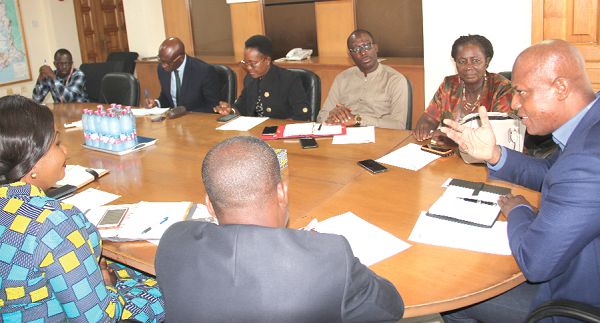
Graphic, IPR agree to tackle poor sanitation, environmental degradation
The Graphic Communications Group Limited (GCGL) and the Institute of Public Relations (IPR)), Ghana have pledged to work together to tackle the issues of poor sanitation and environmental degradation.
The two institutions have also undertaken to campaign against open defecation and the proliferation of slums, as well as the indiscriminate siting of buildings in the capital, among other infringements.
Moreover, they have resolved to promote ethical standards in journalism practice in the country.
Courtesy call
The decision to partner for development was reached in Accra last Wednesday, when some executive members of the IPR paid a courtesy call on the Managing Director of the GCGL, Mr Ato Afful, in his office.
The visit was intended to deepen the long relationship between the two institutions.
The IPR delegation was led by its President, Ms Elaine Sam, and included Mr Henry Nii Dottey, Honorary Secretary; Ms Esi Hammond, Council Member and Mr Charles Adjei Tetteh, Executive Secretary.
Worrying trend
Mr Afful expressed worry about what he described as insanitary conditions in many places in Accra.
He mentioned open defecation, indiscriminate disposal of waste and the increasing spate of the emergence of slums in the city, as key environmental issues that affected the wellbeing of residents and required urgent attention.
Mr Afful said since both the GCGL and the IPR were key players in the communication space, capable of influencing change, any form of partnership towards national development was a step in the right direction.
“There are a lot of environmental issues that we need to confront as a people. An issue such as open defecation, for instance, is so fundamental to our health and wellbeing that we need to begin to confront it seriously.
It will be useful that as partners in communication we set ourselves up and gear our systems to engage some of these issues. When the people are well, whatever that we do at the consumer, brand, and corporate levels will make meaning,” he stated.
Mr Afful pledged the resolve of the GCGL to support the activities of the IPR to shape the communication industry.
IPR President
Ms Sam agreed with Mr Afful that the country’s environmental issues had reached alarming proportions and that collaboration between the two institutions towards influencing change would do a lot of good.
She stated that apart from ensuring that those in authority acted, it was also important to target the citizenry and get them to change their attitudes towards environmental issues.
“The environment is very well polluted and it is one area that we in IPR believe should make the difference, if we really have to show a positive image of the country to the outside world,” she stated.
Ethical standards
The team commended the staff and management of the GCGL for championing quality journalism in Ghana and West Africa at large.
Members, however, expressed concern over issues of ethics and professionalism that had bedevilled the media landscape and urged the GCGL to work harder to maintain its position as the beacon of quality journalism in the country.